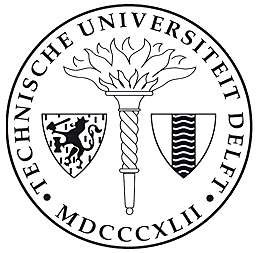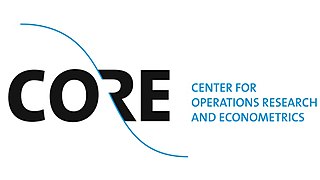
Delft University of Technology also known as TU Delft, is the oldest and largest Dutch public technological university. Located in Delft Netherlands, it is consistently ranked as one of the best universities in the Netherlands and as of 2020, it is ranked by QS World University Rankings among the top 15 engineering and technology universities in the world.
Postgraduate education involves learning and studying for academic or professional degrees, academic or professional certificates, academic or professional diplomas, or other qualifications for which a first or bachelor's degree generally is required, and it is normally considered to be part of higher education. In North America, this level is typically referred to as graduate school.

A doctorate or doctor's degree or doctoral degree, is an academic degree awarded by universities, derived from the ancient formalism licentia docendi. In most countries, it is a research degree that qualifies the holder to teach at university level in the degree's field, or to work in a specific profession. There are a number of doctoral degrees; the most common is the Doctor of Philosophy (PhD), which is awarded in many different fields, ranging from the humanities to scientific disciplines.

A thesis or dissertation is a document submitted in support of candidature for an academic degree or professional qualification presenting the author's research and findings. In some contexts, the word "thesis" or a cognate is used for part of a bachelor's or master's course, while "dissertation" is normally applied to a doctorate, while in other contexts, the reverse is true. The term graduate thesis is sometimes used to refer to both master's theses and doctoral dissertations.
The Fulbright Program, including the Fulbright–Hays Program, is one of several United States Cultural Exchange Programs with the goal to improve intercultural relations, cultural diplomacy, and intercultural competence between the people of the United States and other countries through the exchange of persons, knowledge, and skills. Via the program, competitively-selected American citizens including students, scholars, teachers, professionals, scientists and artists may receive scholarships or grants to study, conduct research, teach, or exercise their talents abroad; and citizens of other countries may qualify to do the same in the United States. The program was founded by United States Senator J. William Fulbright in 1946 and is considered to be one of the most widely recognized and prestigious scholarships in the world. The program provides approximately 8,000 grants annually – roughly 1,600 to U.S. students, 1,200 to U.S. scholars, 4,000 to foreign students, 900 to foreign visiting scholars, and several hundred to teachers and professionals.

A graduate school is a school that awards advanced academic degrees with the general requirement that students must have earned a previous undergraduate (bachelor's) degree. A distinction is typically made between graduate schools and professional schools, which offer specialized advanced degrees in professional fields such as medicine, nursing, business, engineering, speech-language pathology, or law. The distinction between graduate schools and professional schools is not absolute since various professional schools offer graduate degrees and vice versa.
Habilitation is a qualification required in order to conduct self-contained university teaching, and to obtain a professorship in many European countries. Despite changes implemented in European higher-education systems consequent to the Bologna Process, habilitation is the highest qualification issued through the process of a university examination, and remains a core concept of scholarly careers in these countries.

The Bologna Process is a series of ministerial meetings and agreements between European countries to ensure comparability in the standards and quality of higher-education qualifications. The process has created the European Higher Education Area under the Lisbon Recognition Convention. It is named after the University of Bologna, where the Bologna declaration was signed by education ministers from 29 European countries in 1999. The process was opened to other countries in the European Cultural Convention of the Council of Europe, and governmental meetings have been held in Prague (2001), Berlin (2003), Bergen (2005), London (2007), Leuven (2009), Budapest-Vienna (2010), Bucharest (2012), Yerevan (2015), Paris (2018), and Rome (2020).
Doctor of Science, usually abbreviated Sc.D., D.Sc., S.D., or D.S., is an academic research degree awarded in a number of countries throughout the world. In some countries, "Doctor of Science" is the degree used for the standard doctorate in the sciences; elsewhere the Sc.D. is a "higher doctorate" awarded in recognition of a substantial and sustained contribution to scientific knowledge beyond that required for a Doctor of Philosophy (PhD). It may also be awarded as an honorary degree.
A licentiate is a degree below that of a PhD given by universities in some countries. In others, for example almost all countries in the European Union, a licentiate is a 3 to 4 years degree, equivalent to a bachelor's degree. The term is also used for a person who holds this degree. The term derives from Latin licentia, "freedom", which is applied in the phrases licentia docendi meaning permission to teach and licentia ad practicandum signifying someone who holds a certificate of competence to practise a profession. Many countries have degrees with this title, but they may represent different educational levels.
The Norwegian School of Economics or NHH is a business school situated in Bergen, Norway. It was founded in 1936 as Norway's first business school and has since its establishment been a leading teaching and research institution in the fields of economics and business administration.

Walden University is an online for-profit university headquartered in Minneapolis, Minnesota. It offers Bachelor of Science, Master of Science, Master of Business Administration, Master of Public Administration, Master of Public Health, Education Specialist, Doctor of Education, Doctor of Business Administration, and Doctor of Philosophy degrees.
The Master of Philosophy is a postgraduate degree. An MPhil typically includes a taught portion and a significant research portion, during which a thesis project is conducted under supervision. An MPhil may be awarded to postgraduate students after completing taught coursework and one to two years of original research, which may also serve as a provisional enrollment for a PhD programme.

The European University Institute (EUI) is an international postgraduate and post-doctoral teaching and research institute established by European Union member states to contribute to cultural and scientific development in the social sciences, in a European perspective. EUI is designated as an international organisation. It is located in the hills above Florence, Italy. In 2020, EUI's School of Transnational Governance, with its flagship graduate and executive program, will move to the Casino Mediceo di San Marco, which is a late-Renaissance or Mannerist style palace in the historic center of Florence.

The Swiss Graduate School of Public Administration is a Swiss graduate school of public administration. In 2014, the independent foundation was integrated into the University of Lausanne.

A Doctor of Philosophy is the most common degree at the highest academic level awarded following a course of study. PhDs are awarded for programs across the whole breadth of academic fields. Because it is an earned research degree, those studying for a PhD are usually required to produce original research that expands the boundaries of knowledge, normally in the form of a thesis or dissertation, and defend their work against experts in the field. The completion of a PhD is often a requirement for employment as a university professor, researcher, or scientist in many fields. Individuals who have earned a Doctor of Philosophy degree may, in many jurisdictions, use the title Doctor with their name, although the proper etiquette associated with this usage may also be subject to the professional ethics of their own scholarly field, culture, or society. Those who teach at universities or work in academic, educational, or research fields are usually addressed by this title "professionally and socially in a salutation or conversation." Alternatively, holders may use post-nominal letters such as "Ph.D.", "PhD", or "DPhil". It is, however, considered incorrect to use both the title and post-nominals at the same time.

Metropolia University of Applied Sciences is the largest University of Applied Sciences in Finland situated in Helsinki metropolitan area. The university has four fields of study: culture, business, health care and social services, and technology. Teaching is also provided in English.
The International Graduate School in Molecular Medicine Ulm (IGradU) of Ulm University has been established in 2006 and is supported by the Excellence Initiative of the German Federal and State Governments since 2007. It promotes and supports graduate education and training in the field of biomedical research. There are two structured training programs on offer: The International PhD Programme in Molecular Medicine Ulm for doctoral candidates in the natural sciences and the program Experimental Medicine for doctoral candidates in medicine.

Doctor of Law or Doctor of Laws is a degree in law. The application of the term varies from country to country and includes degrees such as the Doctor of Juridical Science, Doctor of Philosophy (Ph.D.), Juris Doctor (J.D.), and Legum Doctor (LL.D.).

The Center for Operations Research and Econometrics (CORE) is an interdisciplinary research institute of the University of Louvain (UCLouvain) located in Louvain-la-Neuve, Belgium. Since 2010, it is part of the Louvain Institute of Data Analysis and Modeling in economics and statistics (LIDAM), along with the Institute for Economic and Social Research (IRES), Louvain Finance (LFIN) and the Institute of Statistics, Biostatistics and Actuarial Sciences (ISBA).












